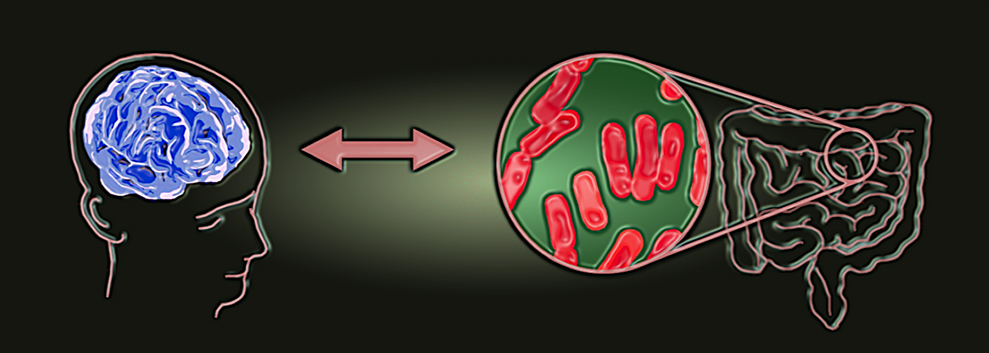In a recently published article in Frontiers in Psychiatry, international researchers and clinicians reviewed the literature on the relationship between gut microbiota and the risk for severe mental disorders (SMD). The authors, led by Italian researchers Gabriele Sani and Mirko Manchia, looked at the evidence from animal and human studies to highlight the field’s current understanding of how gut microbiota changes in individuals with serious mental disorders (SMDs) and offer some speculative models to explain their relationship.
“One biological component, partly inherited, that has been so far neglected in risk prediction of SMD, is the microbiota. The human microbiota consists of the ensemble of microbes, including viruses, bacteria, and eukaryotes, that inhabit several ecological niches of the organism,” the authors explain.
“Due to its demonstrated role in modulating illness and health, much interest has focused on the characterization of the microbiota inhabiting the gut. In fact, alterations of the gut microbiota have been linked, among the others, to obesity, maturation of the immune system, and response to drugs. Of particular interest is the modulating role that the microbiota acquires in human behavior.”
 The authors define SMDs as chronic and recurrent psychiatric diagnoses such as ‘schizophrenia,’ ‘bipolar disorder,’ and ‘major depressive disorder’ that often are less responsive to treatment. Citing the major health disparities and inequities of people diagnosed with SMDs, they focused on preventative methods to improve outcomes for those at clinical high risk for SMD.
The authors define SMDs as chronic and recurrent psychiatric diagnoses such as ‘schizophrenia,’ ‘bipolar disorder,’ and ‘major depressive disorder’ that often are less responsive to treatment. Citing the major health disparities and inequities of people diagnosed with SMDs, they focused on preventative methods to improve outcomes for those at clinical high risk for SMD.
Recent findings have demonstrated links between diet and mental health, linking pro-inflammatory diets of high-fat and sugar to poor mental health outcomes. Research has also found improved quality of life and depressive symptom reduction for patients diagnosed with depression who adhered to the Mediterranean diet.
Emerging research has also demonstrated links between the gut microbiota and mental health, named by neuroscientists as the microbiota-gut-brain axis. For instance, significant differences were found in the microbial makeup of those with increased depressive symptoms and lower reported quality of life than healthy controls.
The authors identified several studies showing decreased biodiversity in the microbiome for those diagnosed with SMDs compared to healthy controls. For instance, bacteria labeled as facultative anaerobes were more likely to be found in the gut microbiota of medication-free patients diagnosed with schizophrenia, bipolar disorder, and major depressive disorder.
It has been posited that gut dysbiosis (persistent imbalance of the gut’s microbial community) and leaky gut (increased permeability of the gut lining that allows for ‘leaking’ into the bloodstream) could affect mental health through pathways such as immune regulation, oxidative/nitrosative stress, and neuroplasticity.
While looking at the differences between specific disorders and healthy controls, the authors acknowledge there is limited evidence on how microbiota might vary in individuals at risk for SMD and individuals at later stages of SMD. Noting that the microbiome is simultaneously shaped with the nervous system and has similar critical development windows, the authors point to growing evidence of the microbiota’s key role in neurodevelopment, especially as a moderating factor of the central nervous system’s (CNS) maturity in early developmental stages.
The authors discuss studies of the perinatal period and the maternal microbiome with its impact on offspring’s psychological development. For one, maternal exposure to stress can alter the offspring’s gut microbiome and affect behavior. Research has connected offspring’s decreased levels of probiotics in the gut with increased anxiety and impaired cognitive functions; increased levels of interleukin-1β, an inflammatory cytokine associated with immune response, and decreased brain-derived neurotropic factor (BDNF) in the amygdala, which is related to neural plasticity, learning, and memory.
The authors concede that much of this research comes from animal studies with mice. In mice fed a high-fat diet, their offspring demonstrated reduced social interactions, poor interest in social novelty, altered sociability.
In another study, offspring from mothers who were given antibiotics during or immediately before mice’s pregnancy had decreased locomotor and explorative activity, low prepulse inhibition, poor social interactions, and anxiety. Interestingly, these behaviors remitted after fostering these mice pups by control mothers.
Lastly, a study of germ-free (GF) mice (those not exposed to bacteria) showed a heightened response to stress from being restrained, reduced BDNF in the hippocampus and cortex, displayed more anxious behavior, and had increased levels of serotonin in the hippocampus. However, when given a strain of Bifidobacterium infantis in early development (pre-weaning), the GF mice’s stress response normalized.
“Cumulatively, these data point toward the existence of specific, and limited, critical periods for the gut microbiota to act on neuronal circuits function and plasticity,” the authors write. “The window of opportunity for the microbiota to impact brain circuits might be different for distinct emotional/social behaviors and, eventually, sensory modalities.”
The authors note that only one study in this review looked at how altered microbiomes affected the risk of developing mental disorders in humans. They found that those at risk for SMD had a clinically significant difference in their global microbiome composition, with those at ultra-high-risk showing greater levels of Clostridiales, Lactobacillales, Bacteroidales, Acetyl coenzyme A synthesis, and anterior cingulate choline levels. The higher choline is thought to result from altered membrane metabolism due to activation of microglia, resident immune cells of the CNS that contribute to neuroinflammation.
From this literature review, the authors propose some mechanisms for how changes in the gut microbiota and gene expressions might moderate the risk of developing a SMD. They cite evidence suggesting that gut microbiota’s effects on the CNS influence mammal behavior and inhibit certain gene expressions. The authors also suggest that certain microbiota may increase blood-brain barrier permeability, predisposing someone to develop a neurodegenerative disorder (e.g., Parkinson’s disease). They also suggest that changes in neurogenesis could lead to cognitive deficits in attention, memory, emotional learning, and executive functioning.
The authors conclude that more research on gut microbiota modifications during the developmental trajectories of SMDs should be done, though only longitudinal research can indicate the directionality of changes in the microbiota-gut-brain axis. They suggest:
“…the analysis of microbiota should be included in the comprehensive assessment generally performed in populations at high risk for SMD as it can inform predictive models and ultimately preventative strategies.”
****
Sani, G., Manchia, M., Simonetti, A., Janiri, D., Paribello, P., Pinna, F., & Carpiniello, B. (2021). The role of gut microbiota in the high-risk construct of severe mental disorders: A mini-review. Frontiers in Psychiatry, 11, 585769. https://doi.org/10.3389/fpsyt.2020.585769 (Link)















“Mental disorders” are collections of symptoms, with little to no concordance between individuals. “Bipolar” is not a distinct illness, it is a category of similar symptoms. “Schizophrenia” has at least nine known etiologies. Suggesting that “SMD” is now a neorodevelopmental illness is a slap in the face to the millions of severely traumatized children and survivors of childhood trauma who know damn well where the source of their distress lies.
Reading this site gives me mental whiplash some days.
Report comment
This seems to be so difficult for some people to understand. To say “there are no ‘mental illnesses’ is not the same as saying that this kind of suffering doesn’t happen. It means that the categories they define don’t mean anything at all! You can group together people with brittle fingernails or people who clean out their ears with their pinkies or people whose hair falls out early or people who have larger breasts on the average, and any one of these can be defined by a list of “criteria” and people can be diagnosed with “Excessive Ear Cleaning Disorder” or whatever you please. But if the grouping of people has nothing in common other than the ostensible “symptoms,” what is the point of it? And to then attribute these “disorders” to “neurodevelopment” without a shred of evidence adds insult to injury! Plus, if some subset of these people really DID have a neurological problem, the psych “diagnoses” immediately become a barrier to discovering this, because they’d be grouped together with a large cohort of people who did NOT have the same problem, and no one would look at these people with an interest in finding the cause.
There is no scientific validity to any “mental disorder.” They are based on arbitrary judgments and assumptions that have no coherent meaning. This is not to say people don’t suffer these described syndromes at times. It’s saying that calling these collections “mental disorders” is worse than pointless – it actually prevents any recognition of any ACTUAL physiological problems that DO exist, while invalidating the importance of life experience as the most important contributing factor to most mental/emotional distress.
Report comment
Thanks, Steve. I have no problem believing that an imbalanced microbiome presents issues with mental functioning. But I was particularly perplexed by the leap to neurodevelopmental disorder and critical windows of development as the culprit. Additionally, the mice whose mothers were given antibiotics during or just before pregnancy and seemed to struggle were assumed to be defective until they were fostered by control mothers and were ok. This seems to suggest that it was the medicated mothers behaviors that was the problem, not the pups own microbiome.
Report comment
Have these scholars realized they just provided a rationale for fasting and diets selected to inhibit inflammatory food reactions? They’re doing the unthinkable- providing treatments for some conditions other than patented psych drugs.
Report comment
Thank you Javier,
I was wondering when this subject would crop up on MIA because it seems to be getting more topical.
If it works it works, we’ll have to wait and see.
Report comment
This would be a good time to announce that I’m waiting, fingers crossed, for my funding proposal to be approved for a study of the relationship between athlete’s foot and school shootings.
Report comment
Seems a very likely connection. I mean, athlete’s foot is embarrassing, causing anxiety and depression, which no doubt leads to violence, since we know all depressed people are violent. I hope you will control for the presence of clotrimazole, though. Could be a confounding factor!
Report comment
We have to forcibly jail all people with athletes foot. Tell them they are dangerous and defective. Later when their lives aren’t up to par it will prove that they are dangerous and defective.
In physics observing a particle changes the particle. Jail, drugging, and slandering someone as defective is a touch more than observing. Psych is a self fulfilling prophecy. Where the proclamations aren’t predicting the future they are creating it.
Report comment
When Psych studies claim a group with a psych label is “drug free” what they mean is the person was once addicted to the drugs but at the current date is no longer taking them. These studies claim someone who is in the middle of withdrawal is “drug free” and therefore all differences are caused by the “illness”. Some will claim someone who took the drugs for decades and has been off them for a few months is “drug free”.
Tobacco companies should have tried this dishonesty. “See the person in tobacco withdraw has all these negative effects and when they smoke some tobacco it relieves their illness. Tobacco is a medicine. Furthermore 6 week studies show tobacco is entirely safe, improves mood, energy, and productivity. Anyone saying tobacco is bad is stigmatizing people with tobacco deficiencies and is anti-science.”
Report comment
I’ve been thinking it was a good time to take up smoking. I could use a good six weeks!
Report comment
If you are tired, unproductive, and/or sad you have a tobacco deficiency in your brain. This is scientific fact because tobacco deficiencies cause lethargy, poor, productivity and sadness. Let’s put you on Camel cigarettes which are evidence based to improve your life. They are non-addicting, anyone saying otherwise is a toxic nutcase and should be cut out of your life. It takes 6 weeks of daily use to receive benefits. If Camel cigarettes don’t work fully we will switch and try Marborlo tobacco for 6 weeks. If that doesn’t fully restore your mood or if you get anxious and have trouble sleeping we will maintain the cigarettes and add another medication called alcohol. Now pay me $200 for the visit, another $500 for the drugs, and come back in a month for another $200 15 minute visit.
Report comment
But cigarettes can also uncover a latent coughing disorder. Which, of course, we can treat with an anti-coughing medication. And later on, you may develop lung cancer. We have found that lung cancer patients seem to have a penchant for cigarettes earlier in their lives. We believe a chemical imbalance in those pre-disposed to lung cancer also leads them to crave cigarettes. Of course, the cigarettes are just a meaningless correlation – the couldn’t POSSIBLY be a causal factor!
Report comment
In science studies done by people selling tobacco, people who have been taking tobacco for decades and quit have higher cancer rates than those who keep using the medication. There are more cancer deaths in tobacco deficient people during years when they do not take tobacco*. Tobacco reduces cancer deaths.
*I’m going to end my snark and explain this. There are psych drug studies where they claim someone who takes the drugs for years-decades and quits counts as “non drug.” In these studies someone taking the drug from age 25-45 counts as 0 deaths on drugs over 20 years. If they quit because the drug caused heart disease and they then die from a heart attack 2 years after quitting it counts as 1 death off drugs over 2 years. The drugs can now be falsely claimed to save lives and extend lifespan!
This fallacy is called the healthy user bias. People in poorer health or who are hurt more by the drugs are more likely to quit the drugs. Contrary to what psych says the people quitting do so mostly because they have not improved or the drugs caused harm.
Report comment
A lame excuse for “science!”
Report comment
I thought of this and think it’s somewhat relevant, so I’m going to cram it in.
A well known chiropractor and natural healer had this to say on the general subject:
When singer Warren Zevon was diagnosed with lung cancer, doctors gave him three months to live. He refused chemotherapy because it would have interfered with working on his last album. He said in an interview, “I didn’t want any drastic alterations to my health – other than dying.”
Warren lasted a year. And he kept right on smoking, till the end. Not exactly a holistic approach, but he quadrupled their estimate without treatment. Using their logic, I guess someone could actually make a case that cigarettes are four times as effective as chemotherapy for terminal lung cancer.
https://thedoctorwithin.com/blog/2009/10/22/to-the-cancer-patient/
Report comment
I have nothing important to say except that I enjoyed reading the comments. Very funny. A nice start to the day.
Report comment
A million girls and young women take tons of laxatives to keep skinny so they will look sexy for porn culture. Goodbye friendly gut biome. Hello major depression. But hey…the doctor says the depression is because of bad parents and he says depression pills will fix it.
Report comment
Most have given up on the idea of “bad parents.” Any suffering is caused by a faulty brain. Because if your brain worked properly, apparently, we’d all be happy with our circumstances, no matter how grim!
Report comment
In practice one effect of the false biological brain defective cause of mental illness is to remove blame from parents, the environment and society. Some of the most fanatic pro-psych people are parents precisely because psych tells them they aren’t at all to blame and instead it’s their child’s defective brain that is the problem. Then they pressure and force their kids to take the drugs because those in authority tell them they should. They blindly accept that their kids lack insight and therefore insist they keep taking the drugs.
When they see that the long term research finds the drugs only make things worse they have two choices, denial and continuing course, or accepting that their questionable actions caused harm.
It reminds me of how gangs initiate new members by having them commit a crime. It’s the sunk loss fallacy in action. In order to get out you have to confront, accept, and deal with the consequences of what you did. It’s much “easier” to deny it, and pretend you’re a self righteous victim of anti-psych science deniers shamming you. It is much easier to do that if you hurl insults at the messenger. It might be easier for people to reject psych if the blame can be transferred to the lying psychiatrists. If they can come to know that guilt doesn’t go away when it is denied. It only ends when it’s is dealt with and atoned for. Alas I’m not sure how to facilitate that.
Report comment
Yes, the magic of “cognitive dissonance.” Nobody likes to be wrong, even when it’s not exactly their fault. But most of what we learn comes from being “wrong” and trying to do better!
Report comment
Fear not, dear Steve. We can still have our cake and eat it. We can still have “bad parents” if we understand that they are probably to blame for deliberately giving us said “bad brains”. Kind of like the old lore in Jane Austen books, about “bad blood”, that mysterious condition that was the mainstay of such historical novels. “Bad blood” was a vague affliction that confusingly seemed to have its origins in “bad behaviour” and that double whammy somehow affected genes in later generations, making auspicious marriages to dukes and landed gentry really rather out of the question.
Bad Parents.
Bad Blood.
Bad Brains.
Maybe there is a pill for it?
Report comment
Bad Brains was a cutting edge punk group in the 80’s. “Bad Blood” and “Bad Parents” are probably still available for as-yet nameless bands. Though I suspect maybe Bad Blood has been snatched up by someone already.
Report comment
Lucky us! If you’ve got an ill, there’s a pill; even it’s something “we” made up not “you.” Thank you.
Report comment
Oldhead, thankyou for cheery ripostes. I am currently unable to wax lyrical due to a migraine caused by light and screen glare, which will pass. And to the author of this piece thankyou for raising a subject of huge importance. It took years for polite society to accept the need for bowel cancer screening. Guts have apparently never been as sexy as glamourous brains and yet the gut is every foetuses first brain. The gut makes most of our serotonin amongst other mood juices.
Report comment
A lyrical waxing disorder? They can be serious, definitely get some rest… 🙂
Report comment